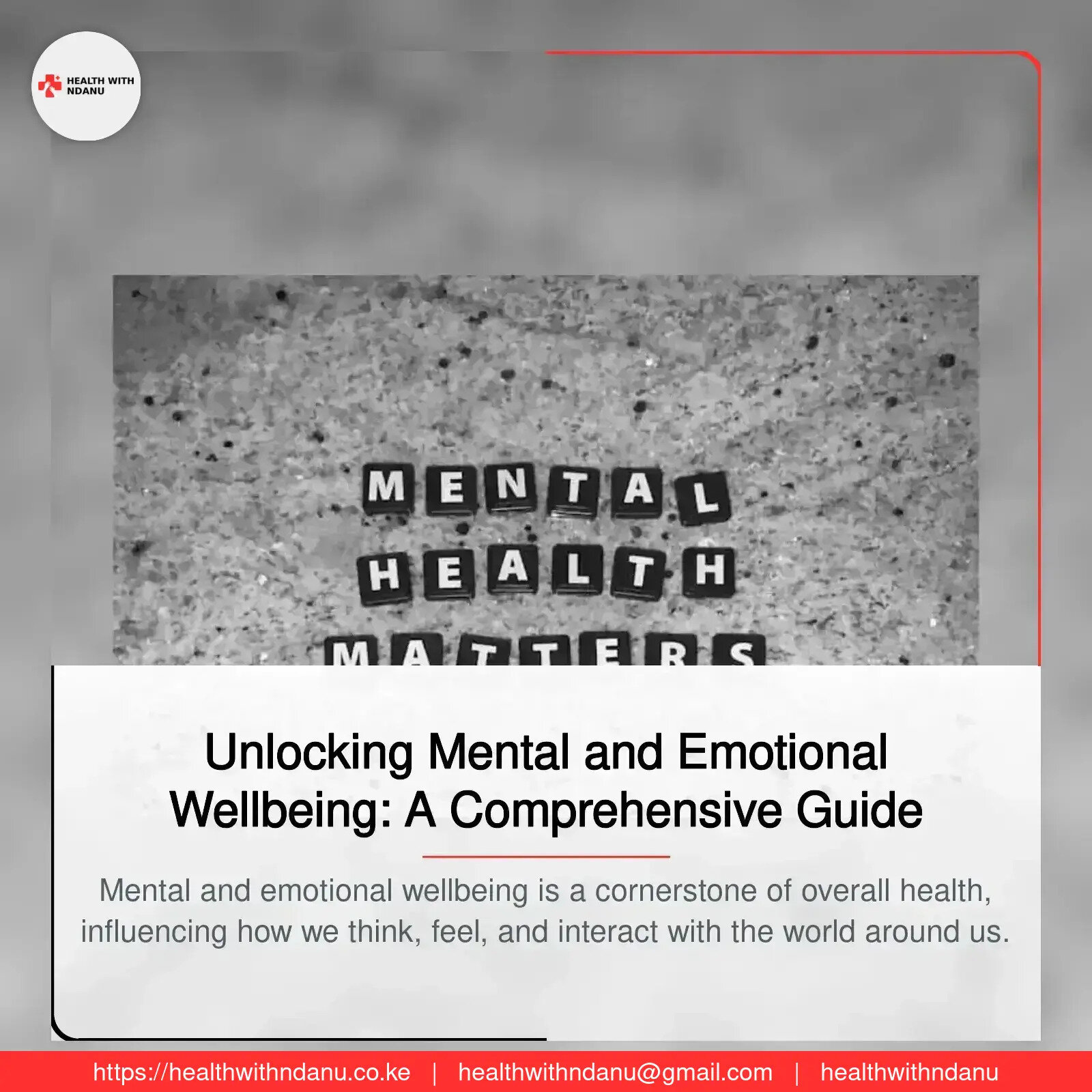Unlocking Mental and Emotional Wellbeing: A Comprehensive Guide
- by Diana Ndanu
- 04 December, 2024
- 0 Comments
- 6 Mins



Introduction
Mental and emotional wellbeing is a cornerstone of overall health, influencing how we think, feel, and interact with the world around us. As society places increasing emphasis on productivity and achievement, it has become more important than ever to prioritize mental health and emotional balance.
In this guide, we’ll delve into the importance of mental and emotional wellbeing, practical strategies to cultivate it, and how it contributes to a healthier, more fulfilling life.
What is Mental and Emotional Wellbeing?
Mental and emotional wellbeing refers to the state of being in which individuals can:
- Effectively handle stress and challenges.
- Build and maintain healthy relationships.
- Make informed decisions.
- Maintain a positive outlook on life.
It encompasses both mental health (cognitive and psychological function) and emotional health (understanding and managing emotions). Achieving a balance between these two aspects ensures resilience, inner peace, and a sense of purpose.
Why is Mental and Emotional Wellbeing Important?
1. Enhances Quality of Life
Good mental health allows individuals to enjoy daily activities, engage in meaningful relationships, and pursue goals with confidence.
2. Boosts Physical Health
Studies show a strong connection between mental and physical health. Chronic stress and emotional distress can lead to conditions such as heart disease, diabetes, and a weakened immune system.
3. Improves Productivity
Mental clarity and emotional stability enhance focus, creativity, and decision-making, contributing to better performance at work or school.
4. Builds Resilience
A strong mental and emotional foundation helps individuals bounce back from adversity, adapt to change, and thrive under pressure.
Common Barriers to Mental and Emotional Wellbeing
Understanding the challenges to mental and emotional wellbeing is essential for overcoming them. These include:
1. Stress and Burnout Chronic stress from work, finances, or personal relationships can lead to burnout, anxiety, and depression.
2. Unhealthy Coping Mechanisms Turning to alcohol, overeating, or avoidance as coping strategies can worsen mental health issues over time.
3. Social Isolation
Lack of social connections can lead to loneliness and exacerbate emotional struggles.
4. Stigma Around Mental Health
Cultural or societal stigma can discourage individuals from seeking help for mental health issues.
5. Poor Sleep Habits
Inadequate sleep affects mood regulation, cognitive function, and overall emotional health.
Strategies to Improve Mental and Emotional Wellbeing
1. Practice Self-Care Self-care
It involves taking deliberate actions to nurture your mental and emotional health. Examples include: Taking breaks during the day to relax and recharge. Engaging in activities that bring joy, such as hobbies or nature walks. Setting boundaries to avoid overcommitment.
2. Adopt Mindfulness Practices
Mindfulness involves focusing on the present moment without judgment. Techniques include:
- Meditation: Spend 10-15 minutes daily in quiet reflection.
- Breathing Exercises: Deep breathing reduces stress and calms the mind.
- Gratitude Journaling: Write down things you’re grateful for to cultivate a positive mindset.
3. Foster Strong Relationships
Healthy relationships provide emotional support and reduce feelings of loneliness. To strengthen your connections:
- Spend quality time with loved ones.
- Communicate openly and honestly.
- Seek out community groups or social clubs to meet new people.
4. Engage in Regular Physical Activity
Exercise releases endorphins, the brain’s “feel-good” chemicals. It also reduces stress, anxiety, and symptoms of depression. Activities such as yoga, walking, or strength training can improve both mental and emotional wellbeing.
5. Prioritize Sleep
Adequate sleep is vital for mental clarity and emotional regulation. Aim for 7-9 hours of sleep per night by: Creating a consistent bedtime routine. Limiting screen time before bed. Ensuring your sleep environment is quiet and comfortable.
6. Seek Professional Help
If mental health challenges persist, consider consulting a professional. Options include:
- Therapists or Counselors: Provide strategies to manage emotions and cope with challenges.
- Psychiatrists: Can diagnose and treat mental health conditions with therapy or medication.
The Role of Nutrition in Mental and Emotional Wellbeing .
Your diet significantly impacts your mental and emotional health.To optimize brain function and mood: Include omega-3 fatty acids (found in fish, flaxseeds, and walnuts) for brain health. Eat foods rich in antioxidants, like berries and leafy greens, to reduce inflammation. Avoid excessive sugar and caffeine, which can lead to mood swings and anxiety.
Stress Management Techniques
Stress is one of the most common disruptors of mental and emotional wellbeing.
Effective strategies include:
1. Time Management Organize your tasks and prioritize activities to avoid feeling overwhelmed.
2. Relaxation Techniques Practices like progressive muscle relaxation, aromatherapy, or listening to calming music can help manage stress.
3. Set Realistic Expectations Avoid overburdening yourself with unrealistic goals. Break large tasks into smaller, manageable steps.
Building Resilience for Emotional Wellbeing Resilience is the ability to adapt and thrive in the face of challenges. To build resilience:
- Develop Problem-Solving Skills: Approach difficulties with a solution-focused mindset.
- Maintain a Growth Mindset: View setbacks as opportunities for learning and growth.
- Practice Self-Compassion: Treat yourself with kindness during tough times.
The Impact of Technology on Mental Health
While technology offers benefits, excessive use can negatively impact mental and emotional wellbeing. To find balance:
- Set boundaries for screen time, especially on social media.
- Use apps that promote relaxation and mindfulness, like Headspace or Calm.
- Disconnect periodically to focus on in-person interactions.
The Role of Employers in Promoting Mental and Emotional Wellbeing.
Workplaces play a crucial role in supporting employees’ mental health. Employers can:
- Provide mental health resources and employee assistance programs (EAPs).
- Foster a supportive work culture that values open communication.
- Encourage work-life balance through flexible schedules or remote work options.
Benefits of Mental and Emotional Wellbeing
1. Improved Relationships
Emotional stability fosters healthy interactions with family, friends, and colleagues.
2. Better Decision-Making
Clear thinking and emotional regulation lead to sound, confident decisions.
3. Increased Resilience
Good mental health equips individuals to handle life’s challenges effectively.
4. Enhanced Physical Health
Reduced stress and improved emotional wellbeing lower the risk of chronic illnesses like hypertension and heart disease.
Conclusion
Mental and emotional wellbeing is a vital aspect of overall health that requires ongoing effort and attention. By adopting healthy habits, seeking support when needed, and prioritizing self-care, individuals can achieve a balanced, fulfilling life. Remember, small changes in daily routines can lead to significant improvements over time. Prioritize your mental and emotional wellbeing today to enjoy a healthier, happier future.
Got Your Own Experience? Share with us
Popular Categories
Most Visited Blogs
Daily Newsletter
Get all the top stories from Blogs to keep track.



